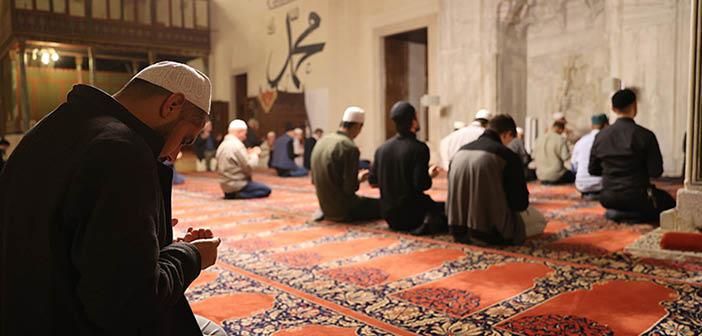
Adhan and Iqamah
What is the adhan in islam? What is the iqamah? What does adhan means? What does iqamah means? What are the differences betweern adhan and iqamah?
A) Adhan
1) The Meaning, Evidence, and Virtue of Adhan
The word adhān literally means “to call, to announce”. Adhān as a term refers to a form of announcement consisting of special words that informs the times of the obligatory prayers. A person who recites the adhān is called muezzin.
Calling the adhān for the obligatory prayers, that is, announcing that these prayers will shortly be performed is established by the Qur’an and the Sunnah. Although the ritual prayer was made obligatory in the Meccan period, the adhān, as we know it today, to inform the believers of the impending prayer was not practiced until the Prophet arrived in Medina. Perhaps this late practice of adhān arose simply because there was no congregational prayer in the early days of Islam. Moreover, when the Muslims migrated to Medina, for a while the time of the prayer was announced in the streets by shouting “aṣ-ṣalah (the prayer)” or “aṣ-ṣalatu jamā’ah (congregate for the prayer)”.
In the first year of the Hijra, when the construction of the Masjid an-Nabawi in Medina was completed, the Companions began to gather regularly and pray in congregation. Meanwhile, Muhammad (saw) consulted with his Companions about the announcement of the time of prayer. Suggestions were offered, such as raising flags, playing the horn, or ringing the bells. However, they did not appeal to the Muslims, since blowing a horn was the way of the Jews, and the ringing of bells was the way of the Christians. At that point, it is related that Abdullah ibn Zayd (ra) from the Ansar dreamed of a man with a bell in his hand and when he wanted to buy it, the man asked what he would do with it. When Abdullah said that he would call people to the ritual prayer with it, the man said “should I tell you something better than this?”. He taught Abdullah all the words of the adhān. As a result of Abdullah informing the Prophet of this dream the next day, and the Prophet Muhammad’s (saw) approval, the modern form of adhān was formed.[1]
In an Islamic society, to call the adhān when the prayer times arrives is a very strong sunnah, almost as strong as a wājib. Since the adhān is a symbol, if it is abandoned en masse, the Islamic community has the right to take action. The evidence on which the adhān is based is as follows:
Allah Almighty says: “When ye proclaim your call to prayer they take it (but) as mockery and sport; that is because they are a people without understanding.”[2], and “O you who believe! When the call is proclaimed to prayer on Friday (the Day of Assembly), hasten earnestly to the Remembrance of Allah, and leave off business (and traffic): That is best for you if you but knew!”[3] Adhān is used in the meaning of announcement and notification in the following Qur’anic verse, “And an announcement from Allah and His Messenger, to the people (assembled) on the day of the Great Pilgrimage…”[4]
The Prophet (saw) has many sayings about the adhān. Some of them are as follows, “One of you should pronounce the adhān for the prayer when its time is due and the oldest one amongst you should lead the prayer.”[5] The Prophet (saw) said the following about Abdullah ibn Zayd’s adhān dream describes above, “Indeed this dream is true. So go to Bilal, for he has a better and louder voice than you. Convey to him what was said to you, so that he may call (to the prayer) with that.”[6]
The following hadith expresses the great reward in calling the adhān as follows:
“If the people knew the reward for calling the adhān and for standing in the first row (in congregational prayers) and found no other way to get that except by drawing lots they would draw lots.”[7] In another hadith, the Messenger of Allah (saw) said: “I see you liking sheep and the wilderness. So whenever you are with your sheep or in the wilderness and you want to pronounce adhān for the prayer raise your voice in doing so, for whoever hears the adhān, whether a human being, a jinn, or any other creature, will be a witness for you on the Day of Resurrection.”[8] One more hadith states the following, “The muezzin will be the tallest of people on the Day of Judgment.”[9]
Yet, the reciting of the iqāmah and leading the prayer is more virtuous than reciting the adhān. This is based upon the fact that the Prophet and the four caliphs who followed him served as imams but did not act as muezzins. However, after the imamate, the most important service in the mosques is the task of the muezzin. In fact, according to the strongest view of the Shafiʿis and the Hanbalis, the adhān and the iqāmah together are more virtuous than being an imam. This is because Allah Almighty commands, “Who is better in speech than one who calls (men) to Allah, works righteousness, and says, “I am of those who bow in Islam”?”.[10]
Aisha (r. anha) informed the believers that the “one who calls to Allah” cited in this verse is the muezzins.
The Prophet (saw) also said, “The imam is the guarantor of the congregation. The muezzin is someone you can trust. O, Allah! Show the imams the right path and forgive the muezzins.”[11]
By means of adhān, the community is informed about the times of prayer, and it is announced that prayer will lead to success, and the highest principles of the religion of Islam are declared to the world. Furthermore, the ritual prayer times around the world coincide with various times of the day. Therefore, at every hour of the day, the existence, unity, and majesty of Allah, the prophethood of Muhammad, and that the ritual prayer is the source of success are announced aloud to humanity around the world.
2) Form and Words of Adhan:
There is a consensus on the known words of the adhān. These words are repeated twice. In the dawn prayer, the sentence “aṣ-ṣalātu khayrun min an-nawm (prayer is better than sleep)” is added after the sentence “ḥayya ‘ala al-falāḥ”. This sentence is also repeated twice. The evidence on which this form of adhān is based is a narration from Bilal (ra). Moreover, it is narrated that the Prophet (saw) said to Abu Maḥdhura that he should recite “aṣ-ṣalātu khayrun min an-nawm” twice when announcing the adhān for the dawn prayer.[12]
According to the Ḥanafis and the Hanbalis, the adhān consists of fifteen words.[13] The Adhān words mentioned in the hadith narrated by Abdullah Ibn Zayd are as follows:[14]
Allāhu akbar اَللّٰهُ اَكْبَرْ
Allāhu akbar اَللّٰهُ اَكْبَرْ
Allāhu akbar اَللّٰهُ اَكْبَرْ
Allāhu akbar اَللّٰهُ اَكْبَرْ
Ashhadu an lā ilāha illallāh أشْهَدُ أنْ لاَ إِلٰهَ اِلاَّ اللّٰهْ
Ashhadu an lā ilāha illallāh أشْهَدُ أنْ لاَ إِلٰهَ اِلاَّ اللّٰهْ
Ashhadu anna Muḥammadan Rasūlullāh أشْهَدُ أنَّ مُحَمَّداً رَسُولُ اللّٰهْ
Ashhadu anna Muḥammadan Rasūlullāh أشْهَدُ أنَّ مُحَمَّداً رَسُولُ اللّٰهْ
Ḥayya ‘ala al-ṣalāh حَىَّ عَلَى الصَّلاَةْ
Ḥayya ‘ala al-ṣalāh حَىَّ عَلَى الصَّلاَةْ
Ḥayya ‘ala al-falāḥ حَىَّ عَلَى الْفَلاَحْ
Ḥayya ‘ala al-falāḥ حَىَّ عَلَى الْفَلاَحْ
Allāhu akbar اَللّٰهُ اَكْبَرْ
Allāhu akbar اَللّٰهُ اَكْبَرْ
Lā ilāha illallāh لا إله إلا الله
Listen to Adhan
The words of the adhān are translated into English as follows:
God is Great! God is Great! God is Great! God is Great!
I bear witness that there is no god but Allah.
I bear witness that there is no god but Allah.
I bear witness that Muhammad is the Messenger of Allah.
I bear witness that Muhammad is the Messenger of Allah.
Hasten to the prayer. Hasten to the prayer.
Hasten to success. Hasten to success.
God is Great! God is Great!
There is no god but Allah.
The iqāmah is similar to the adhān, but after “ḥayya ‘ala al-falāḥ” the sentence “qad qamat aṣ-ṣalāh (the prayer is to begin)” is recited twice. In addition, the adhān is intermittent between each sentence, and the voice is slightly raised in the second sentence, this is called “irtisāl wa tarassul”. Whereas in the iqāmah there is no intermittence, rather it is recited in a quick style called “ḥaḍr”.
3) Conditions of Adhan and Iqamah
Those who recite the adhān and the iqāmah are expected to follow the principles listed below:
a) The time of the ritual prayer must have already commenced: It is not permissible to call the adhān before the prayer time starts. In fact, such an adhān must be re-recited after the prayer time commences. However, according to the majority of jurists, it is mandūb only to call the adhān for the dawn prayer, at the time of pre-dawn, which is the last one-sixth of the night. At that point, this adhān is recited once more as a sunnah when the true dawn (fajr al-ṣādiq) breaks. The evidence is the following hadith reported from Abdullah ibn Amr (ra), “Bilal recites the night prayer. Eat and drink until you hear Ibn Umm Maktum’s adhān.” Bukhari added the following to this hadith, “Ibn Umm Maktum was a blind man and he would not call the adhān unless three people said to him, ‘It is morning.’”[15]
b) The adhān must be in Arabic: The words of the Arabic adhān are symbolic for all Muslims around the world, no matter what language they speak. According to the Ḥanafis and the Hanbalis, since the adhān is established in Arabic, like the Qur’an, it is not valid to read it in any other language. According to the Shafiʿis, it is permissible for a person who does not know Arabic to recite the adhān in another language but only for himself.
c) Announcing the adhān and the iqāmah to the congregation should be aloud but when alone, it should be recited loud enough for him to hear it himself.
d) There must be order and succession between the sentences of the adhān and the iqāmah. Although the adhān not recited without order and in a successive manner is still valid, doing so is considered makrūḥ. It is more virtuous to re-recite such an adhān or iqāmah.
e) Adhān must be recited by only one person. However, it is also permissible for more than one person to recite the entire adhān
f) It is mustaḥab for the muezzin to be a male, intelligent, pious, knowing the sunnah and the prayer times. It is makrūḥ for ignorant people and sinners to call the adhān. It is also makrūḥ for women, the senile, and those who are in major ritual impurity (janabah) to call the adhān or recite the iqāmah. If the adhān and iqāmah are recited by women, the senile, and those in major ritual impurity (janabah), iqāmah does not have to be re-recited, but the adhān For it is permissible to re-recite the adhān as it is on Friday. As a matter of fact, until the time of Uthmān (ra), in the early days of Islam, adhān used to be recited on Fridays when the imam sat on the pulpit. Then, Uthman ordered a second adhān to be recited in a place called Zarwa, between the Masjid al-Nabawī and the bazaar, due to the increase in the population and the growth of the city.[16] It is makrūḥ for people who are not in the state of wuḍū to call the iqāmah. It is stated in a hadith, “None should call the adhān except for one in the state of wuḍū.”[17]
g) The muezzin should have a loud and beautiful voice. For, in this way, it will be easier to announce the adhān and to be heard easily. The evidence is the following hadith, “The Prophet ordered twenty people to call the adhān, and they recited it. He liked Abu Maḥẓūra’s voice among them and taught him the adhān.”[18]
h) In order to announce the adhān, it should be recited standing on a high wall or minaret. Urwa ibn Zubayr reported that his wife, who was from Bani Najjar, said, “My house was the highest house around the Masjid an-Nabawī. Bilal used to recite the call for the dawn prayer on the top of this house. Bilal would arrive at dawn and sit at the high place of the house and wait for dawn time. When he saw the dawn break, he would stand up and call the adhān.”[19]
i) While reciting the adhān, the muezzin extends it by stopping for a while between the two sentences of the adhān. As for the iqāmah, it is recited quickly by not pausing between the sentences. It is stated in a hadith, “O Bilal! When you recite the adhān, recite it slowly, lengthening the words, and when you call the iqāmah, recite it quickly.”[20]
j) While calling the adhān and iqāmah, the muezzin turns towards the qibla. When saying “Ḥayya ‘ala’ṣ-ṣalah” he turns to the right, when saying “Ḥayya ‘ala’l-falāḥ” he turns to the left, and on the minaret, he recites it by walking from the right side to the left. He puts the tips of his two fingers in both ears to help raise his voice. It is narrated from Abu Juhayfa (ra) that he said, “I saw Bilal calling the adhān. He was turning his face right saying Ḥayya ‘ala’ṣ-ṣalah and to the left saying ḥayya ‘ala’l-falāḥ. He had his two fingers in both ears.”[21]
k) It is sunnah to recite adhān and iqāmah for the daily prayers and makeup prayers. This is because the adhān and the iqāmah are sunnah of the prayer, not the time of the prayer, and for that reason, it is also sunnah to call the adhān and the iqāmah while performing the qaḍā According to the narration from Abu Huraira (ra), while the Prophet (saw) and his Companions were returning from the Khaybar battle, they stopped on the way and left Bilal al-Ḥabashi on guard. However, they could not get up for the dawn prayer because Bilal, who was very tired, also fell asleep. After the sun had risen, they performed ablution. Bilal recited the adhān, and after the two-cycle sunnah prayer was performed, he called the iqāmah and the two farḍ cycles of the dawn prayer were performed.[22]
l) If more than one qaḍā prayer is to be performed, whether the place is the same or different, it is considered more virtuous to call adhān and iqāmah separately for each prayer, but if more than one qaḍā prayer is to be performed in the same place, both adhān and iqāmah are recited for the first missed prayer but reciting only iqāmah is enough for the rest of the prayers. As a matter of fact, during the Battle of the Trench when the three daily prayers could not be performed on time, the Messenger of Allah (saw) told Bilal to recite the adhān and iqāmah at the time of the night prayer of the same day and led the noon prayer. Then he led the late afternoon prayer with an iqāmah, the evening prayer with an iqāmah, and finally, the night prayer with an iqāmah.[23]
According to Imam Malik, only the iqāmah is called for the qaḍā prayers, it is not necessary to call the adhān. The evidence on which this view is based is that the Messenger of Allah (saw) ordered Bilal to call only the iqāmah for the missed prayers in the Battle of the Trench.[24] Imam Malik is of the opinion that the adhān mentioned in the hadith was for the night prayer of that day, recited in its own time.
m) It would be appropriate to separate the adhān and the iqāmah a little. This break should be long enough to recite three short Qur’anic verses after the adhān for evening prayer and at other times enough to perform a two or four-cycle prayer by reciting twelve verses in each cycle. The evidence is the following hadith, “O Bilal! Wait sometime between the adhān and the iqāmah, long enough for someone who is eating to finish his meal and meet his needs in a normal way.”[25]
According to the Ḥanafis, it is mustaḥab to encourage the believers by calling out, “aṣ-ṣalah! aṣ-ṣalah! ya muṣallīn (O people who pray! To the prayer, to the prayer)” after every adhān in all prayer times because there has been negligence in people’s religious practices.
n) If there is a break between the iqāmah and the prayer, such as eating, drinking, or washing, it is necessary to recite the iqāmah However, if the person who calls the iqāmah performs the sunnah cycles after the iqāmah or if the imam comes after the recitation of the iqāmah, it is not necessary to re-recite the iqāmah.
o) The muezzin should call the adhān with the intention of getting a reward from Almighty Allah. This is because Uthman Ibn Abi al-ʿĀss, one of the Companions, came to the Prophet and said, “Assign me to be an imam for my people!” Allah’s Messenger said, “You are their imam, so take the weakest of them as a measure and appoint a muezzin who does not get paid for reciting the call to prayer.”[26] However, Imam Malik did not see any harm in the payment of such a fee, Imam Shafiʿi said that a salary from the booty fund of the state treasury can be offered, and the later Ḥanafi jurists issued a fatwa that a fee could be charged for services such as imamate, serving as a mufti, teaching the Qur’an and serving as a muezzin. The basis of this fatwa is to ensure that such duties are carried out in the face of religious slackness and negligence that arise due to the discontinuation of payments and salaries allocated for scholars and imams from the state treasury.
4) Manners of Listening to Adhan
a) It is more virtuous for those who hear the adhān to stop speaking, and even for the person reading the Qur’an to stop and listen to the adhān. However, according to another view, a person who is reading the Quran in a mosque or in his own home can continue reciting. On the other hand, there are also those who say that there is no harm in speaking or continuing their regular work during the adhān.
b) It is mustaḥab for the person who hears the adhān and the iqāmah to repeat the sentences along with the muezzin and when it is said “ḥayya ‘ala’ṣ-ṣalah and ḥayya ‘ala’l-falāḥ”, the hearer says, “la ḥawla wa lā quwwata illa billah (There is no might or power except with Allah)” and when muezzin says “aṣ-ṣalatu khayrun min an-nawm (prayer is better than sleep)” in the dawn prayer, the listener says, “ṣaddaqta wa barirta (you said the truth, and you said it well)”.
The Prophet said, “When you hear the adhān, say what the muezzin says.”[27] In a hadith narrated by Umar (ra), the Messenger of Allah (saw) commanded the person who hears the call to the prayer to repeat exactly what the muezzin says, and to say “la ḥawla wa lā quwwata illa billah (There is no might or power except with Allah )” instead of the words ḥayya ‘ala’ṣ-ṣalah and ḥayya ‘ala’l-falāḥ”.[28]
c) Anyone who hears the adhān can also recite the following prayer from the narration of Ṣaʿd ibn Abi Waqqāṣ (ra) who related that the Prophet (saw) said, “When someone hears the adhān if he says ‘ashhadu an lā ilaha illa’llāh wa ashhadu anna Muḥammadan ‘abduhū wa Rasūluh Raḍiytu billahi Rabban wa bi Muḥammadin rasūlan wa bi’l-Islami dīnan’, his sins will be forgiven.”[29] The meaning of the supplication is, “I testify that there is no god but Allah, that He is one and has no partners, and that Muhammad is His servant and Messenger. I have chosen Allah as Lord, Muhammad (saw) as Messenger, and Islam as religion.”
d) Since the purpose of the adhān is a call to prayer, the person who performs the obligatory ritual prayer is the most appropriate person to respond to the adhān.
e) It is mustaḥab to recite the supplication of wasīlah after the adhān. This is because, according to the narration from Jabir (ra), when the Messenger of Allah (saw) heard the adhān, he informed that his intercession would be lawful on the Day of Judgment for the person who recited the following prayer:[30]
“Allāhumma Rabba hadhihi ad-da’wat at-tāmmah wa aṣ-ṣalāt al-qāimah, ati Muḥammadan al-wasīlata wa al-faḍīlata, (wa ad-darajata ar-rafī’ah), wab’athhu maqāman maḥmūdan alladhī wa’addah, (Innaka lā tukhlifu al-mī’ād).”
Meaning: “O Allah! O Allah, who is the Lord of this perfect call and the prayer to be performed! Give Muhammad the means and virtue (and high rank)! Raise him to the praised rank that You promised Yourself (Surely You will not break Your promise).”
A person who is in a state of major impurity (janabah) is also subject to the supplications related to the adhān. Since menstruating or women in postpartum bleeding are exempt from ritual prayer, they do not have any obligations regarding the adhān.
In places where more than one call to prayer is heard, answering the first call to prayer is sufficient.[31]
5) Reciting Adhān at Occasions other than literally Calling People to the Prayer
It is mandūb to call the adhān on some occasions other than calling the people to the ritual prayer. These occasions can be listed as follows:
a) When a child is born, it is mandūb to call the adhān in the infant’s ear. For when the grandson of the Prophet (saw) Hasan was born, the prophet recited the adhān in his ear.[32]
b) It is mandūb to call the adhān during a war, when a fire breaks, or after sending someone on a journey.
c) It is mandūb to recite the adhān for a violently angry person, a person who is suffering from a nervous breakdown, or from a disease such as epilepsy, and to call the adhān in the ear of a bad-tempered person or even an animal. If an evil jinn or Satan appears in a frightening form, the adhān is called to protect oneself from such evil. For it is proven by hadiths that the devil runs away when the adhān is recited.[33]
B) Iqamah
It is sunnah for men to call the iqāmah for the obligatory prayer or the qaḍā prayers individually or in the congregation. Women have no obligation to call the adhān or the iqāmah, however, if they do recite the adhān or the iqāmah, according to Ḥanafis, it is considered makrūḥ and the adhān they recited must be re-recited. According to Imam Malik, it is a good deed for women to recite iqāmah, and according to Imam Shafiʿi, it is a good deed for women to recite both adhān and iqāmah.[34]
It is not permissible to recite more than one adhān for any farḍ prayer other than the Friday prayer and to recite more than one iqāmah for any farḍ prayer. Therefore, if the prayer of a certain time is performed with the adhān and iqāmah in a mosque, those who will pray the same prayer in the same mosque later, individually or in a congregation, do not need to recite the adhān and iqāmah again. In fact, people who want to perform the obligatory prayer of the time at home or at work after the adhān is called, do not need to call the adhān themselves, and even if they pray in congregation, they do not have to call the iqāmah. However, it is mustaḥab for them to call the iqāmah when they pray in a congregation. There is no iqāmah for prayers such as witr, Eid, and tarawīḥ prayers.
The words of the iqāmah are the same as in the adhān. However, after حي على الفلاح “ḥayya ‘ala’l-falāḥ”, the sentence قد قامت الصلاة “qad qāmat aṣ-ṣalāt (the prayer is to begin)” is added twice. The sentences of iqāmah are recited in pairs, just like the adhān. The evidence for this is the following hadith, “Abdullah ibn Zayd al-Anṣarī (ra) came to the Prophet and said: “I saw in my dream that a person with two green cloaks climbed onto a wall and recited the adhān in pairs and called the iqāmah.”[35] Upon the order of the Prophet, the practice of adhān commenced by teaching these words to Bilal (ra).
According to the Shafiʿis and the Hanbalis, the words of the iqāmah consist of eleven sentences that are read once. Only the word “qad qāmat aṣ-ṣalāt” is repeated twice. They relied on a hadith reported from Abdullah Ibn Umar on this issue.[36] According to Malikis, all sentences except the takbīrs are recited once. takbīrs are recited twice.
It is sunnah to recite the iqāmah quickly but it has to be clear enough to indicate its letters. As in the case of adhān, it is sunnah to call the iqāmah in the state of wuḍū, facing the qibla, and avoiding acts such as walking and talking.
[1] Abū Dawūd, Ṣalāh, 27, 28; H.No: 498, 499.[2] Al-Mā’ida, 5: 58.[3] Al-Jumʿa, 62: 9.[4] Al-Tawba, 9: 3.[5] Al-Bukhari, Adhān, 17, 18, 49, 140, Aḥad, 1, Adab, 27, Maghāzī, 53; Muslim, Masājid, 292, 293; al-Nasā’ī, Adhān, 8.[6] Al-Tirmidhī, Mawāqīṭ, 25, Abū Dawūd, Ṣalāh, 28; Ibn Maja, Adhān, 1.[7] Al-Bukhari, Adhān, 9, 32, Shahadāt, 30; Muslim, Ṣalāh, 129; al-Tirmidhī, Mawāqīṭ, 52; al-Nasā’ī, Mawāqīṭ, 22, Adhān, 31.[8] Al-Bukhari, Adhān, 5; Bad’ al-Khalq, 12, Tawḥīd, 52; Al-Nasā’ī, Adhān, 14; Malik, Muwaṭṭā’, Nida, 5; Aḥmad ibn Hanbal, III, 6.[9] Muslim, Ṣalāh, 14; Ibn Maja, Adhān, 5; Ibn Hanbal III, 169, 264, IV, 95, 98.[10] Fussilat, 41: 33.[11] Al-Tirmidhī, Ṣalāh, 39; Aḥmad ibn Hanbal, II, 232, 284, 278, 382, 419.[12] Al-Zaylaī, Naṣb al-Raya, I, 264.[13] Kāsānī, Badāyi’, I, 147; Ibn al-Humām, Fatḥ al-Qadīr, I, 167; Ibn Abidīn, Radd al-Mukhtār, I, 35 ff.; Ibn Qudāmah, Mughnī, I, 404.[14] Al-Zaylaī, ibid, I, 259.[15] Al-Bukhari, Adhān, 11, 13, Shahadāt, 11, Ṣawm, 17; Muslim, Ṣiyām, 36-39; al-Tirmidhī, Ṣalāh, 35; al-Nasā’ī, Adhān, 9, 10.[16] Abū Dawūd, Ṣalāh, 219; al-Nasā’ī, Jumʿa, Hadith No: 1493; al-Tirmidhī, Cuma’, Hadith No: 516; Ibn Maja, Jumʿa, H.no: 1135.[17] Al-Tirmidhī, Ṣalāh, 33; al-Ṣan’ānī, Subul al-Salām, I, 129.[18] Al-Darimī, Ṣalāh, 7.[19] Al-Zaylaī, ibid, I, 292.[20] Al-Tirmidhī, Ṣalāh, 29.[21] Al-Ṣan’ānī, ibid, I, 122; al-Shawkanī, ibid, II, 46.[22] Abū Dawūd, Ṣalāh, 11, H.No: 435, 443; al-Nasā’ī, Mawāqīṭ, 54, 55; Aḥmad ibn Hanbal, IV, 444; al-Tahānawī, ibid, II, 126.[23] Al-Haythamī, Majmaʿ al-Zawā’id, II, 4; Al-Shawkanī, ibid, I, 359, II, 60.[24] Al-Darimī, Ṣalāh, 186; al-Nasā’ī, Mawāqīt, 55; Adhān, 23; Ibn Hanbal, III, 25.[25] Aḥmad ibn Hanbal, Musnad, V, 143.[26] Abū Dawūd, Ṣalāh, 39, Hadith No: 531; al-Tirmidhī, Ṣalāh, 41; al-Nasā’ī, Adhān, 32; Ibn Maja, Adhān, 3; Aḥmad ibn Hanbal, IV, 217.[27] Al-Bukhari, Adhān, 7; Muslim, Ṣalāh, 10, 11; Al-Tirmidhī, Ṣalāh, 40, Manaqib, 1; Al-Nasā’ī, Adhān, 33, 35-38; Ibn Maja, Adhān, 4.[28] Muslim, Ṣalāh, 12.[29] Muslim, Ṣalāh, 13.[30] Al-Bukhari, Adhān, 8. Tafsiru Surah, 17-11; Muslim, Ṣalāh, 11; al-Nasā’ī, Adhān, 37; Abū Dawūd, Ṣalāh, 37, Hadith No: 529.[31] Al-Kāsānī, ibid, I, 155; Ibn al-Humām, ibid, I, 173; Ibn Abidīn, Radd al-Mukhtār, I, 367; al-Shirazī, Muhadhdhab, I, 58; Ibn Qudāmah, ibid, I, 426 ff.; al-Zuhaylī, ibid, I, 552 ff.[32] Abū Dawūd, Adab, 107; al-Tirmidhī, Aḍāḥī, 16; Aḥmad ibn Hanbal, VI, 9, 391, 392.[33] Al-Zuhaylī, ibid, I, 561, 562.[34] Akyüz, ibid. vol. 1, p. 390.[35] Al-Zaylaī, ibid, I, 266-267; Ibn Maja, Adhān, 6 ; Aḥmad ibn Hanbal, V, 232.[36] Al-Shawkanī, ibid, II, 43.
Source: Basic Islamic Principles (ilmiḥal) According to the Four Sunni Schools With Evidence From The Sources of Islamic Law, Prof. Hamdi Döndüren, Erkam Publications











